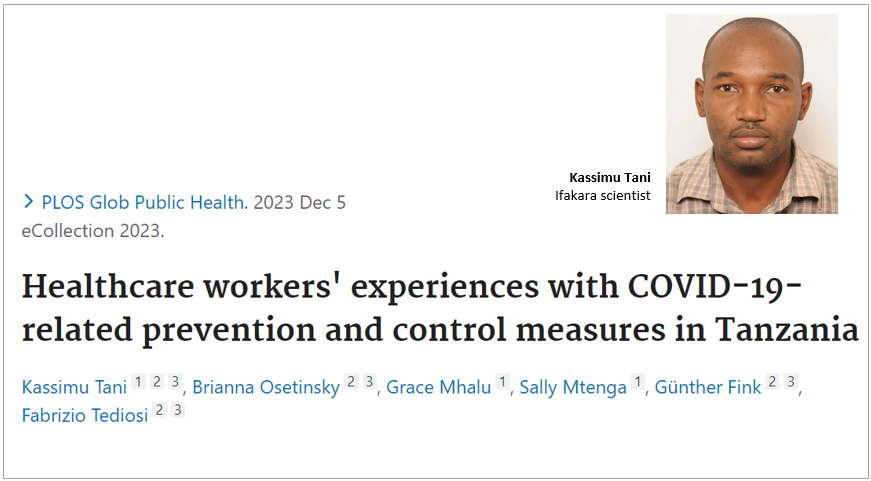
COVID-19: Safeguarding healthcare workers during global crises

In a recent study, researchers who investigated the experiences and perceptions of healthcare workers (HCWs) in Tanzania during the COVID-19 pandemic, have strongly recommend targeted interventions that will protect healthcare workers during global health crises.
The study, published on the PLOS Global Public Health journal, underlines the need for targeted interventions that protect the well-being of HWCs. It aimed to understand the preparedness and challenges frontline workers faced and address COVID-19-related prevention and control measures implemented in Tanzania.
Ifakara led this study
Led by Ifakara Health Institute scientist Kassimu Tani, the study was conducted in collaboration with experts from the Swiss Tropical and Public Health Institute (Swiss TPH) and the University of Basel including Brianna Osetinsky, Günther Fink, and Fabrizio Tediosi. Additional contributors to the study include Grace Mhalu and Sally Mtenga – both from Ifakara.
The study was conducted between December 2021 and March last year, involving 6,884 HCWs from randomly selected districts of Tanzania.
“Despite the growing body of literature on responses to COVID-19, the response of health systems in low-income countries to the pandemic remains poorly understood. Evidence appears to be particularly lacking for the experiences and perspectives of HCWs in low-income settings. This study aimed to address this gap.”
First-of-its-kind study
The study, the first of its kind in Tanzania, focused on HCWs' perspectives regarding the health system's response to the pandemic. Using an innovative approach, the scientists collected primary data through an online questionnaire distributed via WhatsApp groups – a novel strategy in health policy and systems research.
The study, which focused on the implementation of COVID-19 control guidelines, HCW perceptions of safety and well-being, and the challenges encountered, revealed that the majority of respondents were aware of the guidelines and reported implementing preventive measures. These measures included the masking of both HCWs and patients, demonstrating a commitment to adhering to recommended safety protocols.
Challenges HWCs faced
However, despite these efforts, HCWs faced significant challenges during the pandemic including increased stress levels, concerns about infection, inadequate access to personal protective equipment, and differences in perceptions of protection and well-being among different HCW cadres.
Additionally, the study also highlighted that while most HCWs felt supported by facility management, their concerns about COVID-19 treatment were not fully addressed.
“The results of this study highlight the importance of supporting HCWs through the dissemination and implementation of guidelines, as well as social and emotional support to help them cope with the challenges they face. Interventions and policies should be developed to address the challenges identified and strengthen the capacity of the health system to respond to future pandemics,” suggested the scientists.
Call for interventions
The study further underlines the influence of factors such as HCW cadre, facility ownership, and COVID-19 designation status on HCWs' opinions about the health system's response to the pandemic whereby the scientists emphasized the importance of targeted interventions based on risk exposure levels to COVID-19.
“This study shows that HCWs in Tanzania have a high level of awareness and adherence to guidelines aimed at mitigating the impact of COVID-19 in their facilities. However, the study also reveals several challenges faced by HCWs…These findings highlight the importance of consistent implementation of guidelines and social and emotional support for HCWs, as well as the need for targeted interventions based on exposure levels.”
Read the full publication here.
